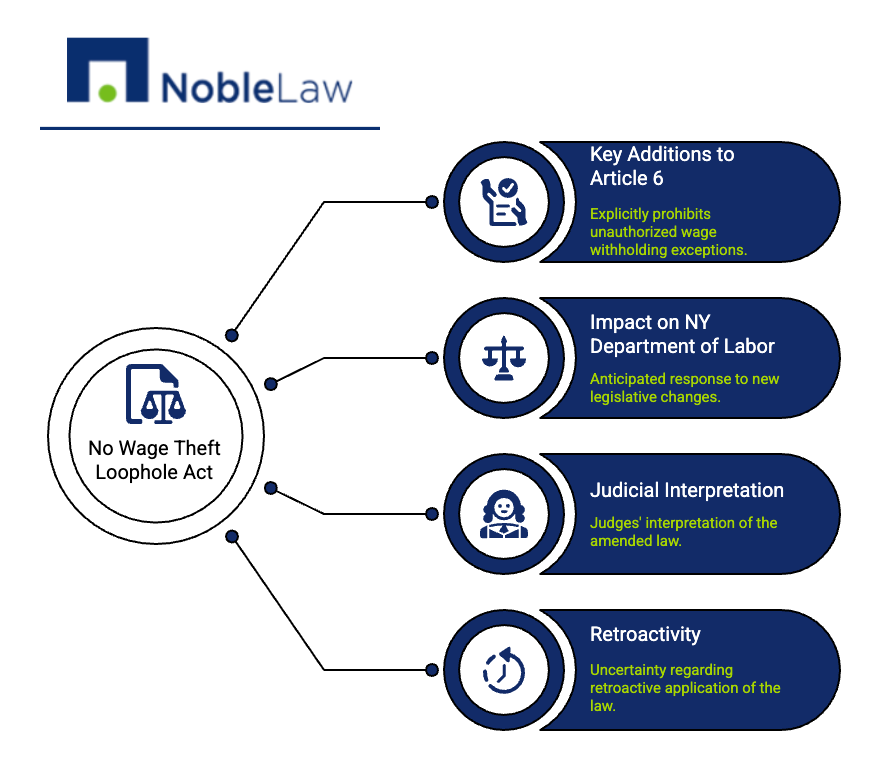The State of New York recently passed a bill closing what many considered a “loophole” in the state’s laws protecting employees against wage theft. Previously, while labor law in New York made it unlawful to withhold portions of an employee’s wage, it was unclear under what circumstances employers could seek exemption. The explicit purpose of Senate Bill S858 is “to clarify that Article 6 of New York’s Labor Law completely and without exception prohibits lack of distribution of earned wages.”
Labor Law in New York
Article 6 of New York’s Labor consists of two critical components. First, the statute identifies specific authorized deductions that employers may utilize while expressly prohibiting any deduction of employee wages unless the deduction is authorized and for the employee’s benefit. The second key component of Article 6 covers what remedies are available to employees if the first component is violated. When an employer withholds or deducts earned wages, benefits, or wage supplements, “all employees shall have the right to recover full wages, benefits and wage supplements and liquidated damages.”
Lawmakers in New York State discovered that what they saw as the plain, clear intent in this law was being interpreted differently by courts. Their concern was centered around the meaning of “deduction”. What if a potential act of wage theft isn’t notated on an employee’s paystub, but simply taken out of the paycheck? Or, what if an employer refuses to pay the full amount of wages and claims that an employee’s smaller paycheck reflects what they earned that month? Lawmakers were even concerned that, based on this narrower interpretation of Article 6, employers might be able to withhold an entire paycheck without facing legal repercussion.
No Wage Theft Loophole Act
The amended law, known as the “No Wage Theft Loophole Act,” became effective upon its signing on August 20, 2021. Key additions to Article 6 include the phrase “There is no exception to liability under this section for the unauthorized failure to pay wages, benefits, or wage supplements.” This verbiage explicitly states that, in addition to partial withholding, holding an employee’s full wage also constitutes unlawful withholding.
As this legislation is newly amended, it remains to be seen how key actors like the NY Department of Labor and judges in New York will respond to the Legislature’s changes. The new legislative language does not address whether it applies retroactively, a gray area that will likely be tested in the near future.
Are You Facing Workplace Misconduct?
Employees have legal protection against employer misconduct, including if they believe that their employer is inappropriately withholding or deducting their wages. If you are dealing with an employment issue, like wage theft, reach out to The Noble Law’s New York offices by calling 212-662-6500, emailing [email protected], or by visiting us at 99 Park Avenue, Suite 1510A, New York, New York 10016. We are proud to serve the entire state of New York.
About The Noble Law Firm
The Noble Law is a women-owned employment law firm with offices in North Carolina and South Carolina, founded by Laura Noble in 2009. Specializing in wrongful termination, workplace harassment, workplace retaliation, workplace mediation, and neutral third-party investigations, the firm is committed to leveling the playing field for employees. Their focus is on delivering positive outcomes with empathy and integrity, while also driving societal change in employment law.
The firm emphasizes diversity, collaboration, and innovation, fostering a balanced work environment that values the personal lives of its staff. With a strong commitment to technology and efficiency, The Noble Law provides personalized attention to a select group of clients, handling cases involving harassment, discrimination, retaliation, and more. The team’s extensive litigation experience allows them to deliver thorough and assertive representation.


